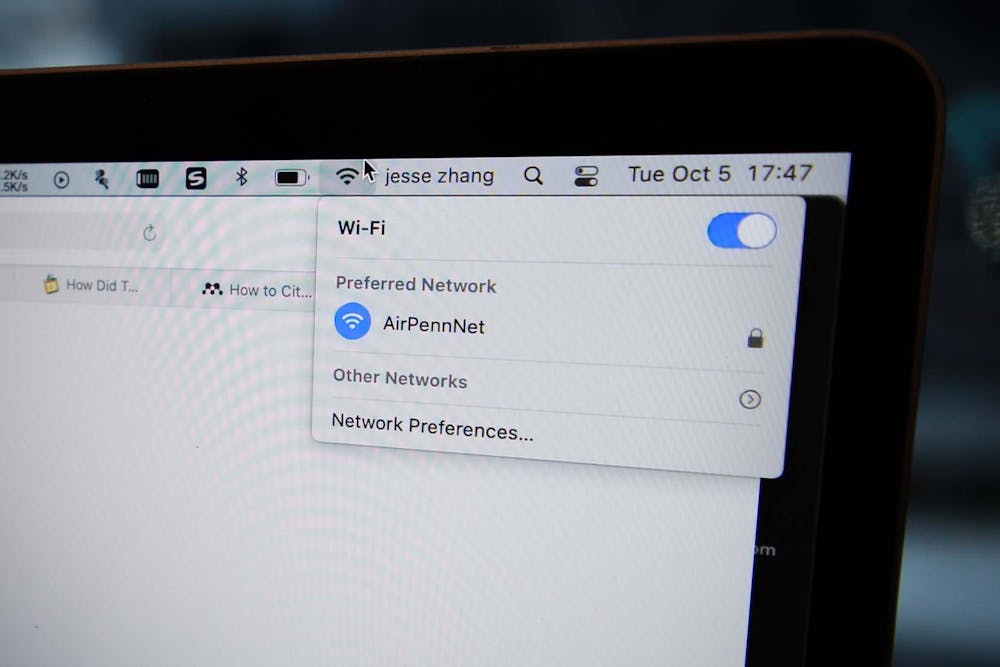Here’s an idea: maybe the University shouldn’t “upgrade” the Wi-Fi in the College Houses. An article this month about Wi-Fi issues in the dorms briefly mentions a mysterious thing called an “Ethernet cable” as a workaround for Wi-Fi issues, but this doesn’t do it justice. Using an Ethernet cable is the best solution.
Wi-Fi wasn’t designed for fast, reliable, high-speed connectivity. It was designed for mobility or when using wires wasn’t an option. In dorm rooms, using a wire is an option. Students should take full advantage of the Ethernet port every dorm room is equipped with, which provides reliable, fast, low-latency internet without using Wi-Fi at all.
While desktops are pretty much guaranteed to come with Ethernet ports, many newer laptops may not have onboard Ethernet adapters. Fortunately, USB to Ethernet adapters are inexpensive and easy to use. Unfortunately, Penn makes you jump through a few hoops in order to take advantage of this premium connectivity option. In on-campus housing, Ethernet ports aren’t activated by default. You’ll need to submit a ticket through College Houses and Academic Services’s technology portal and they will activate the port for you in a couple days. Once activated, most Internet issues students face will simply disappear. On the off chance there is an issue, a few quick troubleshooting tips should resolve the issue.
Need another reason to hardwire your computer? Wireless is incredibly energy-inefficient compared to hardwired communications. Plugging your laptop in is the most sustainable way to network it. Most non-industry-funded, peer-reviewed science also overwhelmingly shows negative health and environmental impacts from wireless technologies. By using an Ethernet cable, you avoid negative wireless exposures.
Climate change is among the most serious issues of this century. It’s also a symptom of larger patterns of rampant environmental destruction. Saying no to wireless technology is an important step that everyone can take to stop further needless destruction. It’s easy to think of Wi-Fi or mobile hotspots as innocent and harmless — after all, the medium itself is invisible — but their impacts are not. From the manufacturing process, which consumes large amounts of rare earth minerals, to the detrimental effects on ecology and people, wireless internet is increasingly becoming a health and environment hazard. Many European schools have begun removing Wi-Fi from classrooms, yet Penn continues to invest in campus wireless. Does anyone see a problem yet?
Noticeably absent from the scene are Penn’s so-called “environmentalists.” Our campus is home to many sustainability groups, none of which have taken any meaningful stance on planned obsolescence, the energy consumption of wireless internet, and environmental devastation caused by these technologies. Take QR codes, for instance. I’ve seen environmental groups distribute flyers with only QR codes to learn more about their cause. However, QR codes explicitly promote widespread environmental destruction; they necessitate that you use a mobile device with wireless connectivity, manufactured in appalling conditions in China or other countries which use massive amounts of rare earth minerals and are shipped across the world so that folks like us can use them for a few years, before they become “obsolete” and are thrown away. You thought they were recycled? Most get dumped on Third World countries, where child laborers mine for scrap metal in conditions approaching slavery. But as long as consumers can buy the next iThing, never mind impacts to health or ecology. Big Wireless says “upgrade”, so why shouldn’t you?
At Penn, I’ve seen solar-powered cell phone chargers awarded as prizes by sustainability groups. Never mind that nothing about the manufacturing of solar panels or cell phones is sustainable, or that this actually incentivizes increased consumption, per Jevons paradox. No wonder many environmentalists feel that “environmentalism” has been hijacked by “feel good” shams that allow environmental destruction to continue in less visible ways. No longer is the question “how can we save the planet?”, but “how can we save our way of life?”
This reflects a broader apathy particularly prevalent today. We condemn baby boomers for today’s gas-powered car culture or demand that the university divest from fossil fuels. But this picture of environmentalism is distorted and incomplete. Why aren’t we demanding divestment from tech companies like Apple and Tesla, which fuel ecologically horrific destruction on a massive scale, or criticizing the pervasiveness of iThings in society?
Such seemingly trivial things as further expansion of Wi-Fi at Penn seem benign, but this is the illusion that must be broken, sooner or later. No generation is immune from its own proclivities towards environmental destruction. Real environmental progress requires a dramatic shift away from these paradigms, a willingness to check your own blind spots, and wrestle with practices that are considered “normal” today. So, what questions will you start asking? “Free Wi-Fi” or “Wi-Fi-free”?
NAVEEN ALBERT is an Engineering junior studying computer engineering from Waukesha, Wisc. His email is naveen23@seas.upenn.edu.









